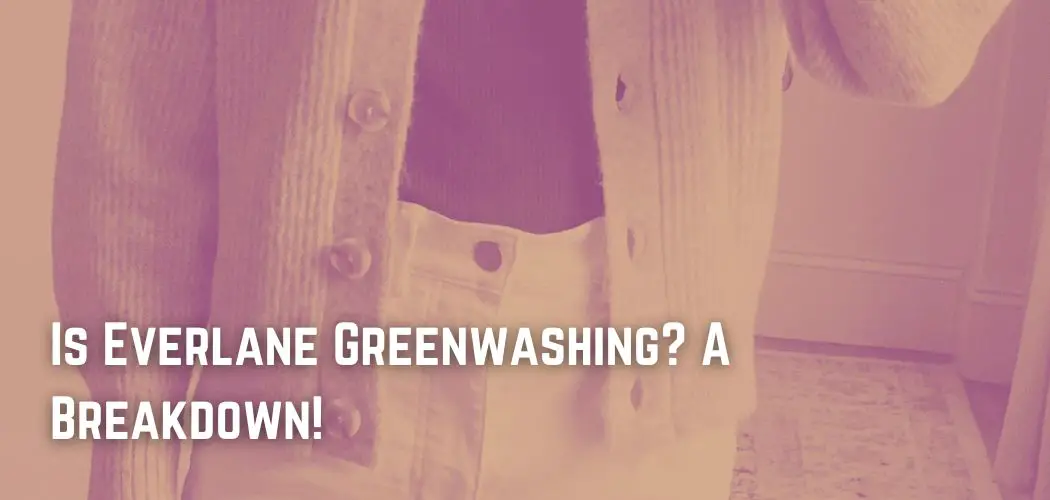Everlane is a chronic offender in the fashion industry when it comes to greenwashing. The brand portrays its garments as ethically created, eco-friendly, and radically transparent.
Nonetheless, this brand conceals a great deal.
Everlane got a meager 22 points in the 2020 Transparency Report, making it one of the lowest-scoring brands on the list and earning only one point more than the fast fashion giant, Forever 21.
This is not an acceptable company.
Everlane was one of the first market leaders in sustainable fashion, which most people find surprising.
In fact, the brand situated in the Bay Area first got great attention for sharing photographs of its factories, but following deeper inspection, it was discovered that the photographs were worth significantly less than 1,000 words.
Although the photographs were attractive to the eye, they showed little about the well-being of the workers. Everlane, like Amour Vert and Allbirds, is not transparent about factory conditions.
In addition, the company does not offset its carbon emissions in any way. Everlane only sold online from 2012 to 2017, so the company shipped all of its products.
Everlane’s CEO stated in September 2019:
There are no fully lucrative online-only businesses; it’s a dirty little secret that you have to ship everything.
We seek to do the right thing for the consumer while maximizing profits. This is a difficult way to manage a business, but we will tell you everything.

However, an extensive investigation conducted through the Remake Seal of Approval Process found that Everlane is not telling us everything.
Since early 2020, Everlane has been in trouble because it doesn’t let its American workers talk about pay with each other or join a union.
The right of workers to unionize is a crucial characteristic of any sustainable brand.
It’s disappointing that Everlane is against unions, won’t share information about working conditions, doesn’t have any plans to save energy, and doesn’t have almost any other proof that it is the sustainable company it has always said it is.
As far as we can tell, Everlane is just another company that uses “greenwashing” to try to make more money.
Animal well-being
Everlane is “Not Good Enough” for our animal companions as well. None of its items contain fur, down, exotic animal skin, or angora.
There is no sign of a formal animal welfare policy, even though there is a general statement about keeping animal suffering to a minimum and being able to track where some animal products come from.
Its score in this category is also affected by the fact that it uses leather, wool, and animal hair from exotic species, even though the company says that its wool comes from sheep that have not been mulesed.
If the source of components made from animals is not known, neither the animals’ nor the workers’ safety can be guaranteed. Everlane needs to make its materials more clear and easy to track, or even better, it should get rid of any parts that come from animals.
Is It Ethical?
Now let’s consider ethics, or how they treat their employees.
Everlane has a Code of Conduct that addresses the following:
- no child or forced labor
- reasonable work hours
- payout of minimum wage or more
- no prejudice
They say that a third party audits factories once a year, but they don’t share the results of those audits.
Even if manufacturers followed the Code of Conduct perfectly, a minimum wage is not always enough to live on. Everlane could be more transparent about pay, like its competitor ABLE, which tells customers what the lowest employee wage is at each of its suppliers.
Despite this, Everlane has increased factory visibility.
Before 2021, they only showed a few pictures of the factories and gave them names like “The Loafer Factory.” They now disclose factory names, employee counts, manufactured goods, and the length of time the firm has worked with them.

Only about eight of every twenty blurbs talk about worker welfare or performance on social audits, and sometimes the descriptions aren’t very detailed.
The following are some examples:
“[Factory management] tries to get rid of discrimination by fostering a culture of acceptance and respect.” (Distribution center for Geodis)
“During our last visit, we looked around the neighborhood cafeteria and talked to some workers about what they did for fun. On weekends, they frequently go to the movies in town or play mahjong in the courtyard. “
Impact On The Environment
In regards to the environment, despite Everlane’s claim of “radical transparency,” there are considerable gaps in the information offered to the public, and in some cases, no information is provided at all.
Therefore, we have assigned Everlane an environmental rating of “Not Good Enough.”
On the bright side, Everlane rejects fleeting fashion trends in favor of traditional, well-made designs that are more likely to be worn for an extended period of time.

This is a major element of ethical fashion. And we were thrilled to see that in September 2017, Everlane launched a new denim line that addresses a number of the environmental concerns associated with denim production.
Additionally, it employs eco-friendly materials, such as recycled fabrics.
There is no indication that Everlane reduces textile waste or works to eliminate dangerous chemicals, nor does it appear to minimize carbon and other greenhouse gas emissions in the majority of its supply chain.
Everlane would receive a higher score if it was more forthcoming about its environmental effect and incorporated more eco-friendly materials, such as organic cotton and recycled wool, into its whole product line.
Conclusion
Based on our own study, we have assigned Everlane the grade “Not Good Enough.” To its credit, Everlane prioritizes timeless designs over fleeting trends, emphasizes product quality and craftsmanship, and recognizes that brands should be open.
In key aspects, though, Everlane does not live up to its own hype.
Everlane’s claims of ‘radical openness’ ultimately fall short due to its inability to trace the majority of its ingredients and its refusal to disclose information on its environmental effect, auditing procedures, and source of animal materials.
As accurately said by a renowned reporter, “In some aspects, the most revolutionary aspect of Everlane is its marketing.”
